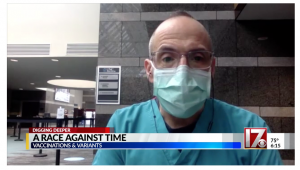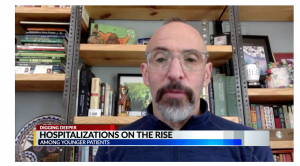David Wohl, MD, professor of medicine in the division of infectious diseases, was consulted for a number of news stories about COVID-19 vaccines, the week of April 1-7, 2021.
 CBS-17: How Vaccines Can Win the ‘Race’ Against COVID-19 Variants – April 5
CBS-17: How Vaccines Can Win the ‘Race’ Against COVID-19 Variants – April 5
Thousands of North Carolinians are receiving doses of the COVID-19 vaccine every day. The numbers of cases of the mutated variant strains of the virus are growing, too. Experts consider it a race between vaccines and variants and explain that how we act will determine which side wins.
“If we can really push forward and vaccinate more and more people, we may outpace the spread of the virus,” said Wohl.
ABC-11: Anyone Over the Age of 16 Can Now Get Vaccinated Against COVID-19 in North Carolina – April 7
All adults in North Carolina are now eligible to get the COVID-19 vaccine. Nearly 39 percent of adults in the state are at least partially vaccinated, and nearly 26 percent are fully vaccinated.
David Wohl, MD, said people seeking a vaccine may need perseverance–especially in the next couple weeks. Despite an increase in vaccine doses available, there still are not enough doses to go around for everybody. He suggested trying a few different organizations such as the local health department and pharmacies.
 WNCT-9: People Between 18 and 49 Make Up Growing Share of COVID-19 Hospitalizations – April 6
WNCT-9: People Between 18 and 49 Make Up Growing Share of COVID-19 Hospitalizations – April 6
People between the ages of 18 and 49 are accounting for a growing share of COVID-19-related hospitalizations across North Carolina, a CBS17.com data analysis found.
The trend partly reflects the simple math of a decrease in the number of older — and more vaccinated — North Carolinians who are winding up in hospitals, but also may indicate younger and middle-aged adults letting down their guard prematurely.
“Younger people — and we’ve seen this happen before — are really the leading edge of our pandemic in this country,” said David Wohl, MD. “Those are the people getting infected.”
CBS-17: Walgreens Begins Spacing 2nd Pfizer Doses Three Weeks Apart Instead of Four – April 5
If you got the Pfizer vaccine at Walgreens, you may have noticed your doses scheduled four weeks apart even though CDC guidance recommends three weeks. The pharmacy chain will be changing that practice.
David Wohl said those who already received their Pfizer doses four weeks apart shouldn’t be concerned in a CBS-17 news story.
“If it was me, I would not be worried about it. I think we know that the immune system is likely going to react three to four weeks after the first shot pretty much the same way. It’s just one company studied it at three weeks and one company studied it at four weeks and there’s a little bit of leeway.”
He also said that people who haven’t yet received their second dose shouldn’t bother rescheduling the next dose.
“I really wouldn’t,” Wohl said. “I would worry more about making things too early. You’ve got to get that first dose and let your body react to it, let it calm down a little bit, and then hit it again.”
FR24 News: Schools and Daycares Blamed For Rise in Wake Coronavirus Infections – April 2
According to the DHHS, at least 26 schools and daycares in Wake County had outbreaks last week, accounting for 230 cases. Most of the K-12 schools on the list are private schools.
David Wohl, MD, said he believes schools can operate safely amid the pandemic. The key in any setting, whether in an office, restaurant or school, is taking the right steps to mitigate the spread of the virus, he said.
“The question is: will we do it? Are we going to do it the right way, and can we trust people to do it the right way? Wohl said.
Blue Ridge Public Radio: Talk to Us, COVID Questions – April 1, 2021
David Wohl, MD, answered a question about COVID-19 in a Blue Ridge Public Radio interview.
“Why does the second COVID vaccine have more side effects than the first?” one caller wanted to know.
Wohl explained how the second shot provokes more of a reaction because the body has been primed and made antibodies against it.
“Those antibodies and other processes can make chemicals that make you feel kind of sick.”
Listen to the interview or read the transcript.